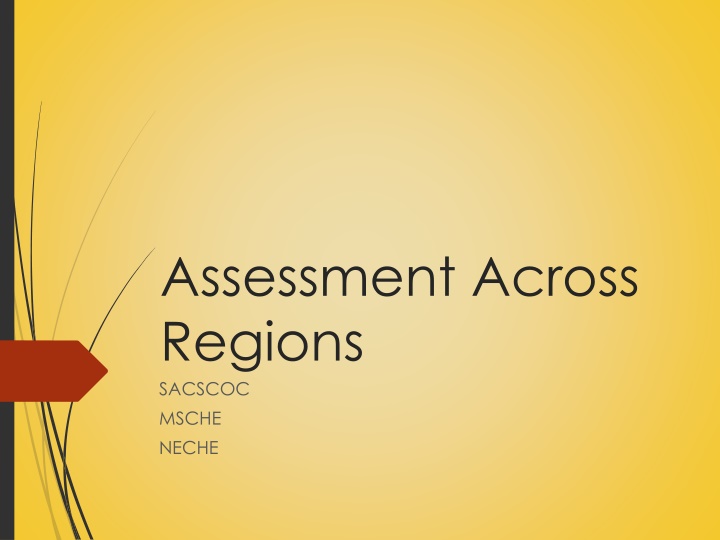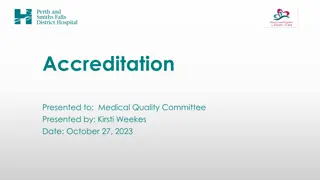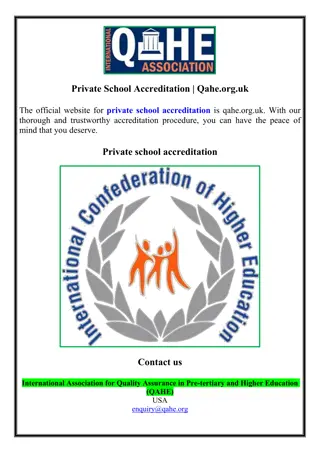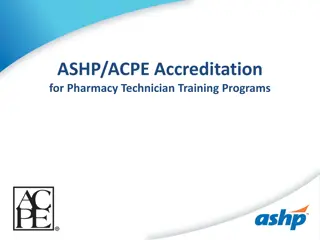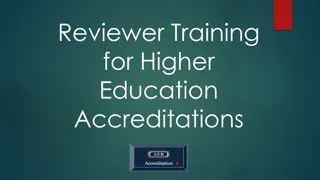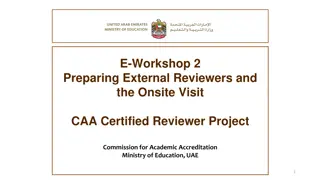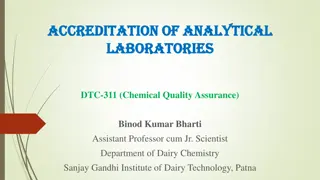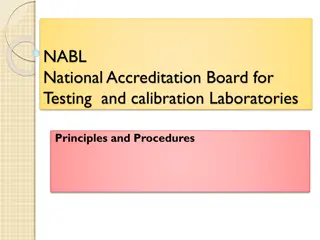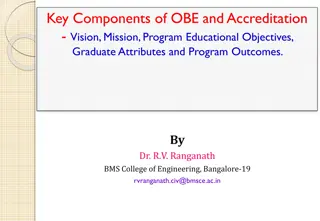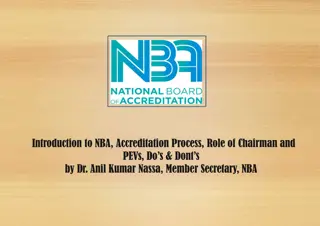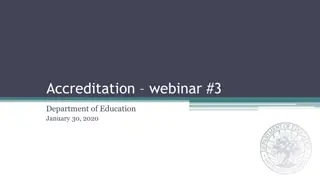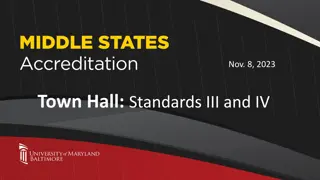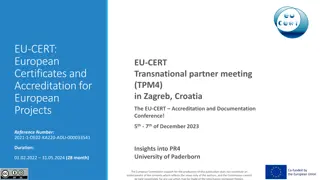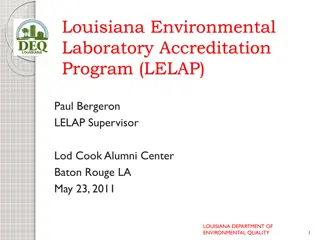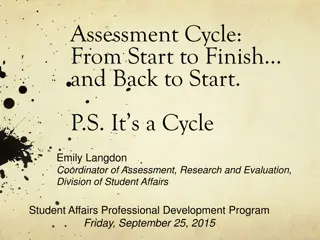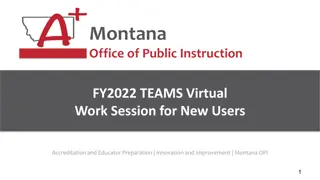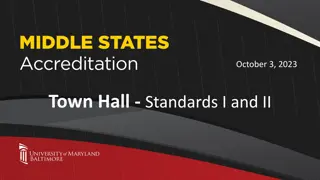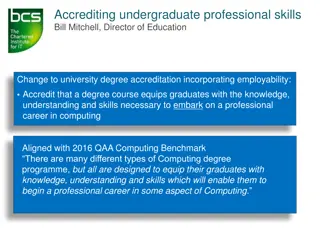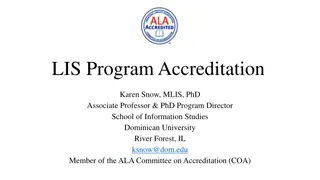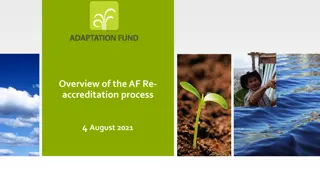Assessment Across Regions for Higher Education Accreditation
This content delves into the importance of assessment in higher education accreditation, focusing on standards set by accrediting bodies like SACSCOC, MSCHE, and NECHE. It emphasizes continuous improvement in educational practices to support students effectively. The article also discusses oversight work by CHEA and the significance of engaging in assessment beyond accreditation requirements.
Download Presentation

Please find below an Image/Link to download the presentation.
The content on the website is provided AS IS for your information and personal use only. It may not be sold, licensed, or shared on other websites without obtaining consent from the author.If you encounter any issues during the download, it is possible that the publisher has removed the file from their server.
You are allowed to download the files provided on this website for personal or commercial use, subject to the condition that they are used lawfully. All files are the property of their respective owners.
The content on the website is provided AS IS for your information and personal use only. It may not be sold, licensed, or shared on other websites without obtaining consent from the author.
E N D
Presentation Transcript
Assessment Across Regions SACSCOC MSCHE NECHE
Levels of Assessment and Accreditation Work SACSCOC Southern Association of Colleges and Schools Commission on Colleges Faculty at Morehouse College, Department Chair of English at Texas Southern University, and Founding Director of MFA Program in Writing and MA Program in Arts Administration at SCAD (Savannah College of Art &Design) MSCHE Middle States Commission on Higher Education Dean of the College of Liberal Arts and Social Sciences at UVI (University of the Virgin Islands) and Vice Provost for Assessment and Curriculum at Ramapo College of New Jersey NECHE New England Commission on Higher Education How do I pronounce the new acronym? Glad you asked. It s neh-chee. Vice President of Academic Affairs at MCLA (Massachusetts College of Liberal Arts)
Oversight Work CHEA (Council for Higher Education Accreditation) Member, Committee on Recognition Involves the periodic scrutiny of accrediting organizations based on the standards and requirements of the CHEA Recognition Policy and Procedures. It includes working with accrediting organizations seeking recognition as well as those currently operating. At present, 60 national, regional and programmatic organizations are recognized by CHEA.
Why Engage in Assessment? Yes for accreditation but so much more Assessment is for constant attention to the work we do to educate and support students at the highest possible levels with a focus on the very best of both traditional and contemporary knowledge, skills, and methodologies Assessment is to remind us as staff and faculty of our responsibility for continuous improvement and not a hasty attention recap every 5 and 10 years of assessment across the institution And, besides, it is so enjoyable!
SACS http://www.sacscoc.org/pdf/2018%20POA%20Resource% 20Manual.pdf (p. 162) Fourteen Standards with most having 3-5 subsections
MSCHE https://www.msche.org/standards/ Seven Standards Fifteen Requirements of Affiliation
NECHE https://cihe.neasc.org/standards-policies/standards- accreditation/standards-effective-july-1-2016 Nine Standards
PROGRAM ASSESSMENT PLANNED & SYSTEMATIC
Establishing Institutional- Wide Assessment Guidelines Academic Academic Support Academic Integrity Organization and Structure Planning and Evaluation Teaching, Learning, and Scholarship Financial Acumen Public Disclosure (Discuss handout)
Assessment in Context First National Conference on Assessment in Higher Education Columbia, SC 1985 Co-sponsored by the National Institute of Education (NIE) and American Association for Higher Education (AAHE)
Managing Assessment Terminology Goals Objectives Outcomes Metrics/Measures/Strategies Targets Findings/Results Planned Actions/Improvements Closing the Loop
Organizing Systems Starting at unit levels Unit Assessment Committee College-wide assessment committees Creation of systematic methodology to collect information and engagement in assessment (samples circulated) Alignment of assessment with institutional Strategic Plan
DISCUSSION This Photo by Unknown Author is licensed under CC BY-NC-ND
IRM[A] [Approach] to Assessment Introductory Reinforcement Mastery In this process, the program looks across the curriculum and determines which courses meet a specific standard at the Introductory, Reinforcement, and Mastery levels of assessment. For each stated standard, the program should determine which courses will meet each standard. Then, the program should establish which assignments will meet each standard and at a determined level of assessment. Actual outcomes should be monitored. It is based on these outcomes that programmatic decisions may be made on how to use those outcomes to improve the program.
Program Assessment Template Sample Program Assessment Template (Can be modified for course level assessment) Goal Objective Outcome Target Measure Finding Action (CtL) Program Program Program Program
